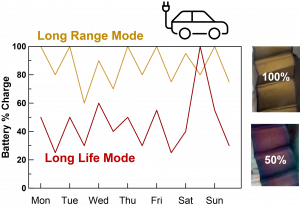 Eniko Zsoldos
Eniko Zsoldos
PhD in Chemistry Candidate
Dalhousie University, Canada
Date: January 22, 2025
Time: 1300–1400h ET
Lithium iron phosphate (LFP) battery cells are ubiquitous in electric vehicles and stationary energy storage because they are cheap and have a long lifetime. This webinar presents studies comparing 240 mAh LFP/graphite pouch cells undergoing charge-discharge cycles over five state of charge (SOC) windows (0%–25%, 0%–60%, 0%–80%, 0%–100%, and 75%–100%). To accelerate degradation, elevated temperatures of 40°C and 55°C were used. It is expected that in more realistic operating temperatures, LFP cells will perform better with longer lifetimes. This study found that cycling LFP cells across a lower average SOC resulted in less capacity fade than cycling across a higher average SOC, regardless of depth of discharge. The primary capacity fade mechanism is lithium inventory loss due to lithiated graphite reactivity with electrolyte, which increases incrementally with SOC, and lithium alkoxide species causing iron dissolution and deposition on the negative electrode at high SOC which further accelerates lithium inventory loss. Results show that even low voltage LFP systems (3.65 V) have a trade-off between average SOC and lifetime. Operating LFP cells at lower average SOC could extend their lifetime substantially in both EV and grid storage applications.
An interactive Q&A session follows the presentation.
Benefits of attending the webinar
- Learn about how to extend the lifetime of LFP/graphite cells by cycling over a lower average state of charge.
- Understand the chemical mechanisms involved in liquid electrolyte degradation pathways, specifically how they cause iron dissolution from LFP and deposition onto the graphite electrode.
- Learn how lithiated graphite’s reactivity with electrolyte has impacts on all types of lithium-ion batteries with a graphite electrode.
Presenter
Eniko Zsoldos is a fifth year PhD candidate in Chemistry at Dalhousie University in the Jeff Dahn Research Group. Her current research focuses on understanding degradation mechanisms in a variety of lithium-ion cell chemistries (NMC, LFP, LMO) using techniques such as isothermal microcalorimetry and electrolyte analysis. Eniko received her undergraduate degree in Nanotechnology Engineering from the University of Waterloo. As an undergrad, she was a member of the Waterloo Formula Electric team, building an electric race car for Formula SAE student competitions. She has completed internships at Sila Nanotechnologies working on silicon-based anodes for batteries, and at Tesla in Fremont, CA, working on dry electrode processing.
Learn more about upcoming ECS Webinars and review our previous webinar recordings.
Thanks to the webinar sponsors who make these complimentary programs possible!
Interested in presenting in the ECS Webinar Series?
Email your presentation title and abstract to education@electrochem.org for consideration.






